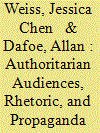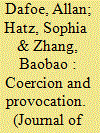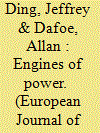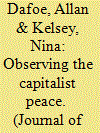|
|
|
Sort Order |
|
|
|
Items / Page
|
|
|
|
|
|
|
| Srl | Item |
| 1 |
ID:
170017


|
|
|
|
|
| Summary/Abstract |
How do government rhetoric and propaganda affect mass reactions in international crises? Using two scenario-based survey experiments in China, one hypothetical and one that selectively reminds respondents of recent events, we assess how government statements and propaganda impact Chinese citizens’ approval of their government's performance in its territorial and maritime disputes. We find evidence that citizens disapprove more of inaction after explicit threats to use force, suggesting that leaders can face public opinion costs akin to audience costs in an authoritarian setting. However, we also find evidence that citizens approve of bluster—vague and ultimately empty threats—suggesting that talking tough can provide benefits, even in the absence of tough action. In addition, narratives that invoke future success to justify present restraint increase approval, along with frames that emphasize a shared history of injustice at the hands of foreign powers.
|
|
|
|
|
|
|
|
|
|
|
|
|
|
|
|
| 2 |
ID:
177023


|
|
|
|
|
| Summary/Abstract |
Threats and force, by increasing expected costs, should reduce the target’s resolve. However, they often seem to increase resolve. We label this phenomenon provocation. We review instances of apparent provocation in interstate relations and offer a theory based on the logic of reputation and honor. We also consider alternative explanations: confounding or mis-imputation of resolve; revelation of information, character, or capabilities; or generalized sunk cost reasoning. Using survey experiments, we systematically evaluate whether provocation exists and what may account for it. We employ design-based causal inference techniques—a hypothetical natural experiment, a placebo treatment, and ruling out mediators—to evaluate our key hypotheses. We find strong evidence of provocation and suggestive evidence that it arises from considerations of honor, vengeance, and reputation. Our experimental design minimizes the risk that this result arises from our alternative explanations.
|
|
|
|
|
|
|
|
|
|
|
|
|
|
|
|
| 3 |
ID:
119654


|
|
|
|
|
| Publication |
2013.
|
| Summary/Abstract |
The greater peacefulness of jointly democratic pairs of states is an important finding in research on the causes of war. Here, we outline a set of criteria for evaluating critiques of such robust empirical associations and apply them to two recent articles. Mousseau (2013) claims that contract-intensive economies, as proxied by a measure of life insurance expenditure, account for the democratic peace. However, his research suffers from various problems of analysis and interpretation, including a miscoded dependent variable, a misleading specification for dyadic democracy, a suppression of heterogeneous associations, and a heavy dependence on imputation in which greater than 90% of the values of the central independent variable were (improperly) imputed. We estimate 144 specifications that build from Mousseau's models and control for life insurance expenditures, finding substantial, robust support for the democratic peace. Gartzke & Weisiger () claim that the importance of the democratic peace has declined as the proportion of democracies in the international system has increased; but their tests are misspecified and do not address the issue they raise. There are also serious errors in their data. When these problems are corrected, we find that the peacefulness of democratic pairs has actually increased as the proportion of democracies grew after 1816.
|
|
|
|
|
|
|
|
|
|
|
|
|
|
|
|
| 4 |
ID:
190703


|
|
|
|
|
| Summary/Abstract |
Major theories of military innovation focus on relatively narrow technological developments, such as nuclear weapons or aircraft carriers. Arguably the most profound military implications of technological change, however, come from more fundamental advances arising from ‘general-purpose technologies’ (GPTs), such as the steam engine, electricity, and the computer. Building from scholarship on GPTs and economic growth, we argue that the effects of GPTs on military effectiveness are broad, delayed, and shaped by indirect productivity spillovers. We label this impact pathway a ‘general-purpose military transformation’ (GMT). Contrary to studies that predict GPTs will rapidly diffuse to militaries around the world and narrow gaps in capabilities, we show that GMTs can reinforce existing balances if leading militaries have stronger linkages to a robust industrial base in the GPT than challengers. Evidence from electricity's impact on military affairs, covering the late nineteenth and early twentieth centuries, supports our propositions about GMTs. To probe the explanatory value of our theory and account for alternative interpretations, we compare findings from the electricity case to the military impacts of submarine technology, a non-GPT that emerged in the same period. Finally, we apply our findings to contemporary debates about artificial intelligence, which could plausibly cause a profound GMT.
|
|
|
|
|
|
|
|
|
|
|
|
|
|
|
|
| 5 |
ID:
163872


|
|
|
| 6 |
ID:
167673


|
|
|
|
|
| Summary/Abstract |
We ask how the offense-defense balance scales, meaning how it changes as investments into a conflict increase. To do so we offer a general formalization of the offense-defense balance in terms of contest success functions. Simple models of ground invasions and cyberattacks that exploit software vulnerabilities suggest that, in both cases, growth in investments will favor offense when investment levels are sufficiently low and favor defense when they are sufficiently high. We refer to this phenomenon as offensive-then-defensive scaling or OD-scaling. Such scaling effects may help us understand the security implications of applications of artificial intelligence that in essence scale up existing capabilities.
|
|
|
|
|
|
|
|
|
|
|
|
|
|
|
|
| 7 |
ID:
180455


|
|
|
|
|
| Summary/Abstract |
What resources and technologies are strategic? Policy and theoretical debates often focus on this question, since the “strategic” designation yields valuable resources and elevated attention. The ambiguity of the very concept, however, frustrates these conversations. We offer a theory of when decision makers should designate assets as strategic based on the presence of important rivalrous externalities for which firms or military organizations will not produce socially optimal behavior on their own. We distill three forms of these externalities, which involve cumulative-, infrastructure-, and dependency-strategic logics. Although our framework cannot resolve debates about strategic assets, it provides a theoretically grounded conceptual vocabulary to make these debates more productive. To illustrate the analytic value of our framework for thinking about strategic technologies, we examine the US-Japan technology rivalry in the late 1980s and current policy discussions about artificial intelligence.
|
|
|
|
|
|
|
|
|
|
|
|
|
|
|
|
| 8 |
ID:
134154


|
|
|
|
|
| Publication |
2014.
|
| Summary/Abstract |
Countries with open capital markets tend to have fewer militarized disputes and wars. Gartzke, Li & Boehmer propose that this association arises from the enhanced ability of states with open capital markets to credibly signal resolve through the bearing of economic costs ex ante to militarized escalation. We test this causal mechanism by qualitatively examining six crucial cases in which the mechanism is most likely to be operative and observable. We employ a formal case selection strategy designed to yield cases with high inferential leverage for our confirmatory test and to select cases for an exploratory analysis of scope conditions. Through analysis of media reports, government documents, and other sources, we evaluate the extent to which relevant individuals drew the appropriate inferences about market-mediated costs and resolve. We conclude that while market-mediated signaling may operate in major conflicts, it is unlikely to account for much of the association between capital openness and peace. Exploratory analysis of our cases identifies potential scope conditions, clarifies the role of different signaling mechanisms, and suggests other explanations for the peaceful behavior of countries with open capital markets.
|
|
|
|
|
|
|
|
|
|
|
|
|
|
|
|
| 9 |
ID:
180672


|
|
|
|
|
| Summary/Abstract |
Reputations for resolve are said to be one of the few things worth fighting for, yet they remain inadequately understood. Discussions of reputation focus almost exclusively on first-order belief change—A stands firm, B updates its beliefs about A’s resolve. Such first-order reputational effects are important, but they are not the whole story. Higher-order beliefs—what A believes about B’s beliefs, and so on—matter a great deal as well. When A comes to believe that B is more resolved, this may decrease A’s resolve, and this in turn may increase B’s resolve, and so on. In other words, resolve is interdependent. We offer a framework for estimating higher-order effects, and find evidence of such reasoning in a survey experiment on quasi-elites. Our findings indicate both that states and leaders can develop potent reputations for resolve, and that higher-order beliefs are often responsible for a large proportion of these effects (40 percent to 70 percent in our experimental setting). We conclude by complementing the survey with qualitative evidence and laying the groundwork for future research.
|
|
|
|
|
|
|
|
|
|
|
|
|
|
|
|
| 10 |
ID:
131532


|
|
|
|
|
| Publication |
2014.
|
| Summary/Abstract |
In April 2013, a controversy arose when a working paper (Herndon, Ash, and Pollin 2013) claimed to show serious errors in a highly cited and influential economics paper by Carmen Reinhart and Kenneth Rogoff (2010). The Reinhart and Rogoff paper had come to serve as authoritative evidence in elite conversations (Krugman 2013) that high levels of debt, especially above the "90 percent [debt/GDP] threshold" (Reinhart and Rogoff 2010, 577), posed a risk to economic growth. Much of the coverage of this controversy focused on an error that was a "perfect made-for-TV mistake" (Stevenson and Wolfers 2013) involving a simple error in the formula used in their Excel calculations. The real story here, however, is that it took three years for this error and other issues to be discovered because replication files were not publicly available, nor were they provided to scholars when asked. If professional norms or the American Economic Review had required that authors publish replication files, this debate would be advanced by three years and discussions about austerity policies would have been based on a more clear-sighted appraisal of the evidence.
|
|
|
|
|
|
|
|
|
|
|
|
|
|
|
|
|
|
|
|
|